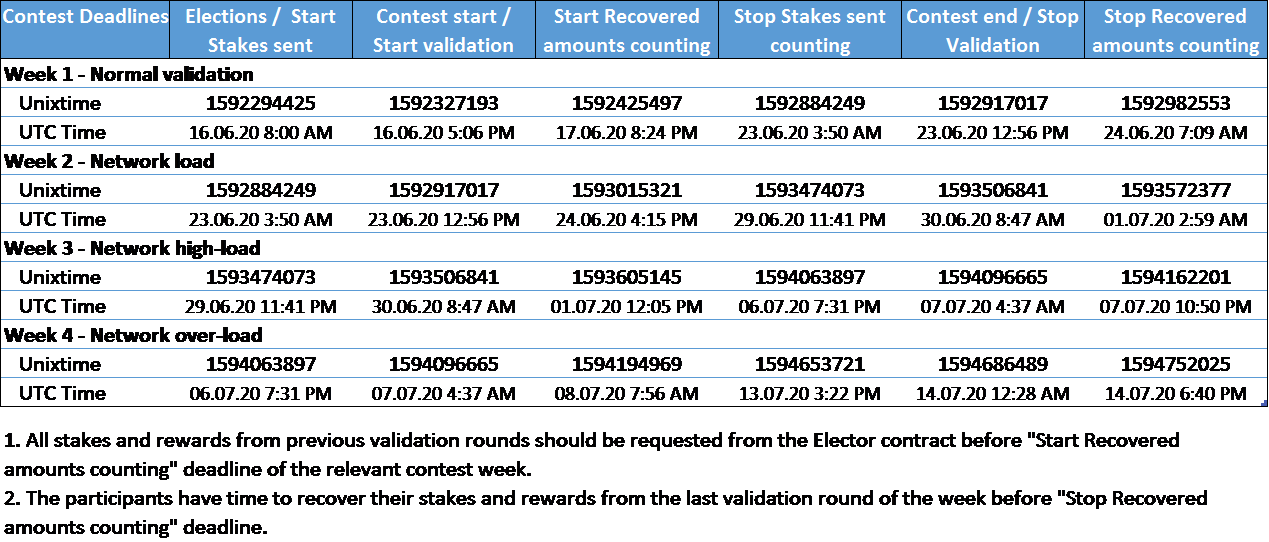There is truth, my boy. But the doctrine you desire, absolute, perfect dogma that alone provides wisdom, does not exist. Nor should you long for a perfect doctrine, my friend. Rather, you should long for the perfection of yourself.
— Hermann Hesse
Short description:
The Crystal Game will ask validators to compete in validation cycles recurrently in order to win the title of Magister Ludi . With each new cycle new winners will be announced.
Prizes: Prizes will be sent from Givers on Free TON to a DePool contract to each winner in amounts ranging from 750,000 Tons to 1,500,000 Tons (Subsidy), which will be returned over a period of 1 to 2 years, depending on the winner’s rating. Additionally, winners will receive a direct reward of 60,000 to 120,000 Tons vested over a 12-month period, also depending on the winner’s rating.
Type: Cyclical contest
Starting Date : June 16, 2020 as per table
Motivation :
To choose the best validators for Free TON
To provide additional long-term incentives for validation
To subsidize capital required to run high performance validators
To provide continuous motivation for supporting DePools as the main tool for decentralization
To disconnect the “staking” layer from the “validation” layer as much as possible
General requirements : Run at least one validator node.
Proposed reward: The total subsidized amount will peak at 300,000,000 Tons (6% of total supply). This amount may be increased in the future.
KYC : Any one team can earn a reward just once. No US residents can get a reward. Before reward distribution a moderate KYC procedure will be performed.
Rules :
List of all validators on the network will be obtained automatically. Each validator will be assigned a random, quirky pseudonym, but can change that name via a transaction to a special smart contract.
List is updated when a new wallet address is used to send messages to the Elector contract.
Note that if you are going to participate with several nodes under the same validator name, the average metric across all your nodes will be counted.
Contest participants are ranked by their score in real-time, and the data is available on the leaderboard at ton.live/leaderboard
The Magister Ludi title will be issued in portions up to 30 per week after the contests end, beginning with top rated winners.
Game rules may change at any time. Game conditions can be amended to any cycle by virtue of community voting; respectively, so may reward amounts increase.
Week 1 (9 validation cycles)
Contest Network : net.ton.dev
Contest Mode : normal validation
Contest Metrics :
- Metric 1: Uptime → Share of blocks signed by a validator (average if several nodes)
- Metric 2: Staking efficiency → max {1; Ave amount recovered/ Ave stake)
- Score: 1 x 2
Rating points : 1-10
Week 2 (9 validation cycles)
Contest Network : net.ton.dev
Contest Mode : network load
Contest Metrics :
- Metric 1: Uptime → Share of blocks signed by a validator (average if several nodes)
- Metric 2: Staking efficiency → max {1; Ave amount recovered/ Ave stake)
- Score: 1 x 2
Rating points : 1-20
Week 3 (9 validation cycles)
Contest Network : net.ton.dev
Contest Mode : network high load
Contest Metrics :
- Metric 1: Uptime → Share of blocks signed by a validator (average if several nodes)
- Metric 2: Staking efficiency → max {1; Ave amount recovered/ Ave stake)
- Score: 1 x 2
Rating points : 1-30
Week 4 (9 validation cycles)
Contest Network : net.ton.dev
Contest Mode : network overload
Contest Metrics:
- Metric 1: Uptime → Share of blocks signed by a validator (average if several nodes)
- Metric 2: Staking efficiency → max {1; Ave amount recovered/ Ave stake)
- Score: 1 x 2
Rating points : 1-40
Winner selection:
Up to 300 highest rated winners who achieve the minimal rating threshold (MRT) will be selected out of all those who participate. If less than 300 achieve this threshold, then only that number of winners will receive rewards.
MRT should be calculated as 35% of the average rating for all participants.
Disclaimer:
Anyone can participate, but Free TON cannot distribute Tons to US citizens or US entities.
Subsidy stakes will not be eligible for voting.
